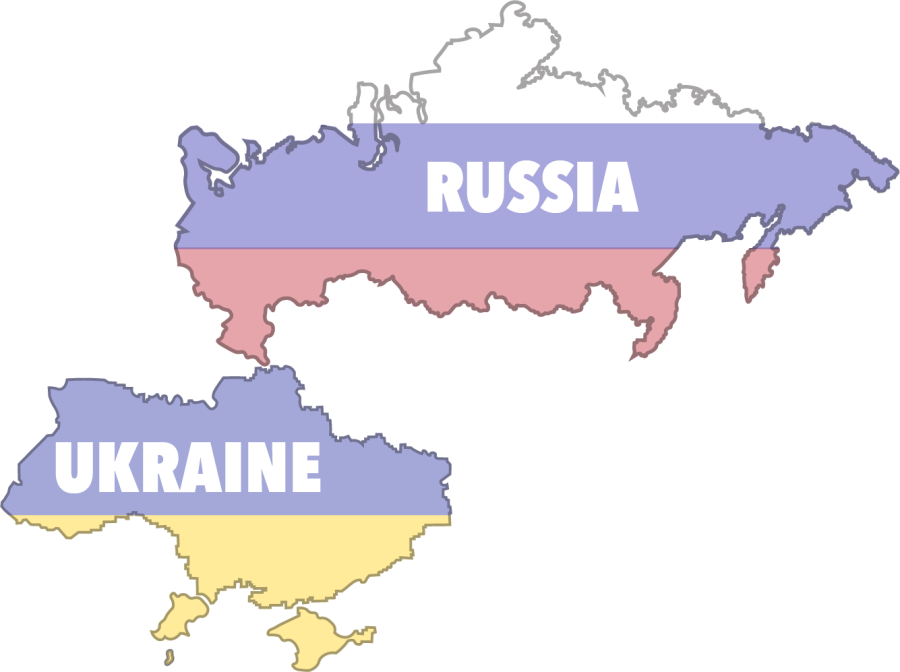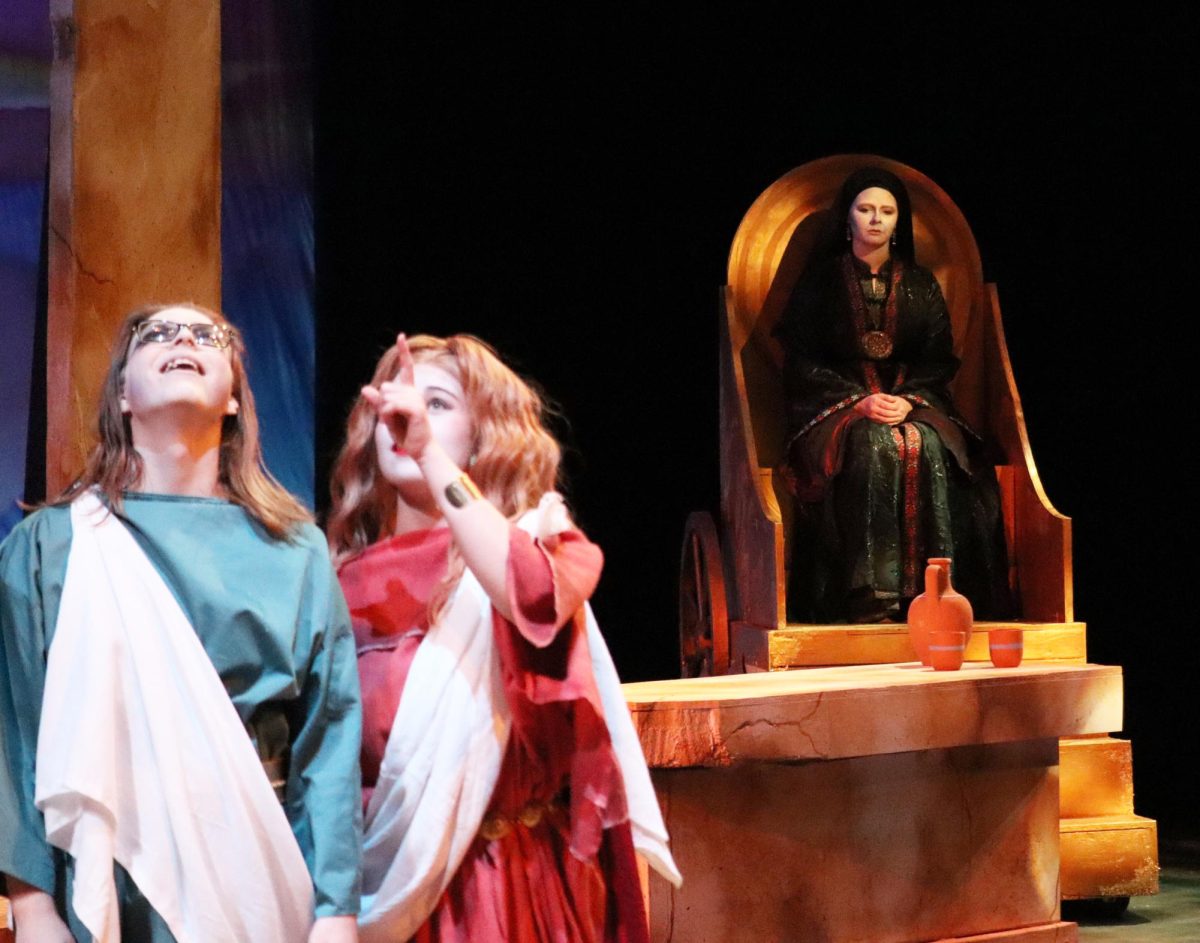From conflict to war: New developments between Russia and Ukraine
Katie Burns
February 25, 2022
At least 40 people are dead in wake of Russia’s wide-ranging military attack on Ukraine this morning around 5 a.m. Ukrainian time—a move that’s been dubbed the largest attack on a European state since World War II.
Explosions were heard near the Ukrainian capital, Kyiv, along with other cities minutes after Russian President Vladimir Putin announced a “special military operation” in a televised address from The Kremlin.
According to Ukrainian authorities, the attack began as an airstrike targeting military bases along the border, later moving to ground invasions across 10 Ukrainian regions. Multiple news sources have reported the wave of attacks involved ballistic missiles, airstrikes, and other heavy artillery.
Ukraine President Volodymyr Zelensky initially responded by cutting off diplomatic relations with Russia and imposing martial law.
“Russia treacherously attacked our state in the morning, as Nazi Germany did in #2WW years. As of today, our countries are on different sides of world history. Russia has embarked on a path of evil, but Ukraine is defending itself & won’t give up its freedom no matter what Moscow thinks,” Zelensky said in a tweet.
The invasion spurred a number of new developments in the Russia-Ukraine conflict. As of mid-day today, Ukrainian presidential adviser Mykhaylo Podolyak said Russian forces captured the Chernobyl nuclear power plant and Hostomel airport, a Ukrainian international cargo airport and testing facility.
According to the Ministry of Defense of the Russian Federation, 83 land-based Ukrainian targets were destroyed, Reuters reported.
U.S. President Joe Biden announced a new round of sanctions on Russia, targeting banks, the high-tech sector and oligarchs while also imposing export controls. Biden said in a televised address to the nation Putin “chose this war” and that Russia will bear the consequences.
In addition to sanctions, the U.S. plans to deploy additional troops and equipment to Germany in an attempt to bolster NATO. Biden was clear in stating that he will not send U.S. troops directly to Ukraine to engage in the conflict with Russia.
NATO Secretary-General Jens Stoltenberg spoke on the situation in a press briefing following a meeting with the North Atlantic Council, strongly condemning Russia’s invasion of Ukraine.
“This is a blatant violation of international law. An act of aggression against a sovereign, independent and peaceful country and a serious threat to Euro-Atlantic security. We call on Russia to immediately cease its military action, withdraw its forces from Ukraine and choose diplomacy,” Stoltenberg said. “We fully support Ukraine’s sovereignty and territorial integrity and Ukraine’s right of self-defense. Russia is using force to try to rewrite history and deny Ukraine its free and independent path.”
Stoltenberg’s full press briefing can be viewed here.
Putin said the attacks were justified to protect the interests of civilians and separatist groups in the Donbas region, who he claimed turned to Russia for help.
“About the situation in the Donbas. We see that the forces that carried out a coup in Ukraine in 2014 seized power and are holding it through sham electoral procedures have given up on the peaceful settlement of the conflict. For eight years, for eight long years, we have done everything possible to resolve the situation by peaceful, political means. All was in vain,” Putin said.
He elaborated by claiming his actions were done in accordance with Article 51 of Part 7 of the UN Charter and was approved by the Federation Council of Russia in pursuance of treaties and mutual assistance ratified by Russia’s Federal Assembly (the Duma) with the DPR and LPR.
“Its goal is to protect people who have been subjected to abuse and genocide by the regime in Kyiv for eight years. And for this we will pursue the demilitarization and denazification of Ukraine, as well as bringing to justice those who committed numerous bloody crimes against civilians, including citizens of the Russian Federation,” Putin said.
Putin’s speech also condemned the U.S. and NATO’s eastward expansion.
“For the United States and its allies, this is the so-called policy of containment of Russia, [which brings] obvious geopolitical benefits. And for our country, this is ultimately a matter of life and death, a matter of our historical future as a people. And this is not an exaggeration – it is true,” Putin said. “This is a real threat not just to our interests, but to the very existence of our state, its sovereignty. This is the very red line that has been talked about many times. They crossed it.”
Putin said his plans did not include the occupation of Ukrainian territories, and he urged the Ukrainian military and armed forces to “lay down their weapons immediately and go home.” He ends by emphasizing that Ukraine’s ruling regime will be responsible for all bloodshed resulting from the invasion. A full transcript of Putin’s speech can be viewed here.
Putin’s speech aired during an emergency U.N. Security Council meeting late Wednesday night, which was held as a last-minute effort to discourage Russian troops from entering Ukraine.
“President Putin, in the name of humanity, bring your troops back to Russia. In the name of humanity, do not allow to start in Europe what could be the worst war since the beginning of this century,” U.N. Secretary-General Antonio Guterres said at the end of the meeting.
U.N. officials fear the war between Russia and Ukraine could have ‘devastating’ humanitarian consequences and encourage neighboring counties to open their borders for citizens fleeing Ukraine.
Poland announced it will set up nine reception centers along its border, as Polish officials expect a significant wave of refugees. These centers would provide citizens food, rest, information and medical care if needed.







